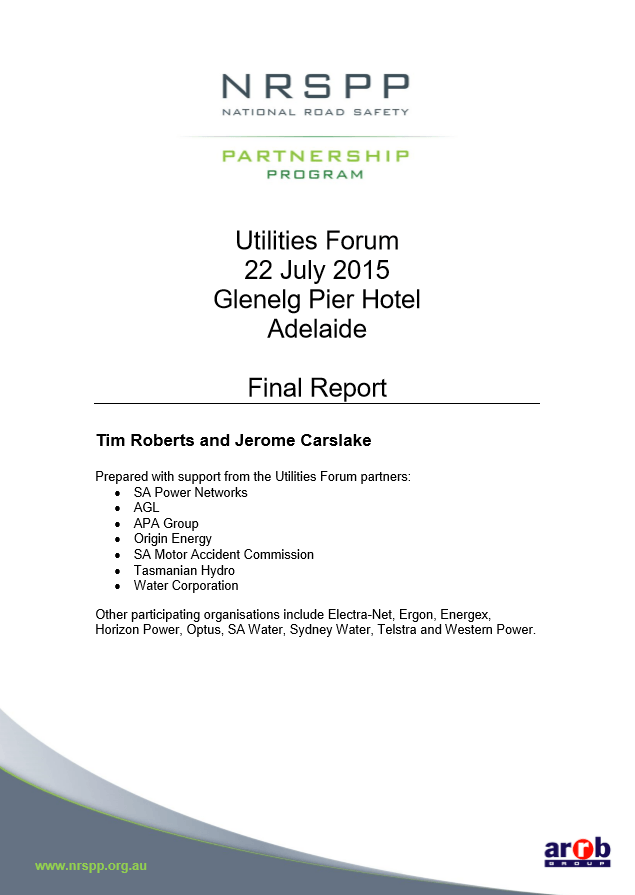2016 NRSPP Utilities Forum – Final Report
On the 25th of August, the 2016 NRSPP Utilities Forum was hosted by Telstra in Melbourne which was attended by 19 different utility organisations from across the country.
The forum took place under Chatham House Rules and included:
- Through the Utilities Forum Template , which partners completed ahead of the day, an understanding of participants’ capabilities and limitations with respect to fleet management data and key lag and lead safety performance indicators.
- A strong industry specific repository of fleet profile and risk data.
- Understanding of key safety issues common throughout the participant group including the identification of three common priority areas
- Fatigue;
- Distraction and remote travel; and
- Cargo or payload.
- Facilitated sharing of learnings and information on what worked for other organisations, what did not work and what pro active approaches have been implemented by other organisations. This was highlighted throughout the day with presentations from Telstra, Downer, IAG and Engistics and the benchmarking reports prepared with data from the Utilities Forum Template.
- The development of a strong peer network that was evident through the formal sessions and continued informally throughout breaks during the day and the evening’s networking event.
2016 Utility Forum Partners
Please read the report for more details which contains material which was agreed to be shared thus allowing for a frank and open discussion in a trusted environment.
The Utilities Forum Guiding Partners consisted of Telstra, Origin Energy, SA Power Networks, SA Water, Tasmanian Hyrdo, Water Corporation and CGU who steered the direction and development of the forum.
A data template was developed with the assistance of the working group that allowed for the capture of information in the following key areas:
- Business profile
- Fleet size
- Ownership and management model
- Operating environment and utilization
- Road safety management
- Journey management and mobility planning
- Driver recruitment, selection, induction, management and well being
- Vehicle selection, safety, management, maintenance and security
- Corporate, community and supply chain road safety
- Technology profile
- IVMS purpose/priorities (if installed)
- Systems and process development
- Top three transport related risks
- Lead indicators captured
- Lag indicators captured
- Insurance and crash information
- Traffic infringements
- Expectations and outcomes.
The data was then collated and prepared for presentation at the forum. It was also used to produce benchmarking reports for the individual organisations indicating where each organisation was in relation to the rest of the forum participants. The template was also instrumental in developing resources and the agenda for the forum.
Stage 2. Conduct Utilities Forum
The second forum was held on 25 August 2016 at the Telstra Conference Centre in Melbourne. A total of 19 organisations were represented including ARRB Group (organiser) and Telstra (hosts). In addition to the guiding Utilities Forum partners, the day was also attended by ActewAGL, Ausgrid, AusNet Services, BAI Communications, Comdain, Electra-Net, Energex, Optus, Queensland Urban Utilities, Santos, Sydney Water and United Energy & Multinet Gas.
- welcome and overview of the NRSPP
- setting the scene (the list of participants)
- ascertaining the size and scope of the transport safety risk
- presenting the profile and benchmarking data captured in the template
- a presentation on advanced driver safety analytics by Telstra
- a presentation on organisational safety culture by Downer
- a presentation on vehicle selection by IAG
- workshop discussion of the following:
- driver recruitment
- organisational leadership and culture o road safety management
- a presentation on heavy vehicle crash investigations and load restraint by Engistics
- dinner hosted by NRSPP.
The following illustrates the identified transport risks across the forum partners:





